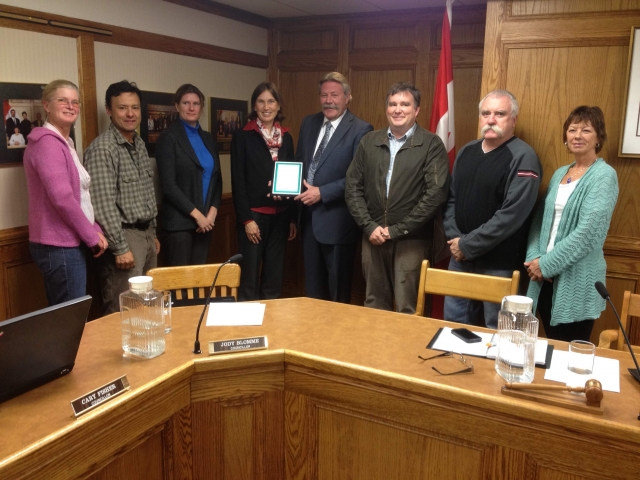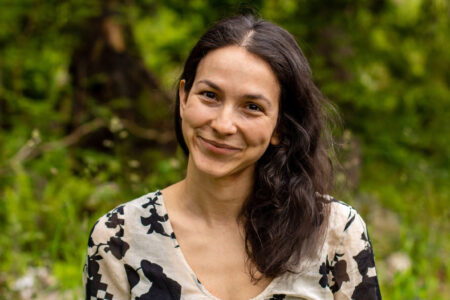Rossland named an "energy leader," receives award from BC Community Energy Association
Rossland’s unique and effective Energy Diet has earned the city an Honourable Mention for a Climate and Energy Action Award, whose sponsors include province of British Columbia, the Union of British Columbia Municipalities (UBCM), Fortis BC, and BC Hydro.
Patricia Dehnel, an energy planner from the Community Energy Association, and the West Kootenay liaison for Carbon Neutral Kootenays, presented the award, reporting “17 outstanding submissions” this year in three categories.
Specifically, Rossland’s award was in the public sector collaboration category, a new category this year “to recognize the unique and productive partnerships between provincial public sector organizations and local governments as they move forward together to realize GHG reductions and energy efficiencies,” Dehnel said.
Rossland was selected by an independent judging panel because the town “successfully mobilized a significant number of homeowners and all local businesses, around the idea of energy conservation and building retrofits,” Dehnel said.
The winner of the public sector category was North Vancouver for School District No. 44’s new geothermal heat pump. The corporate operations category was won by Nakusp for a large number of energy retrofits including hot spring heating, 6500W of solar power, and a microhydro project. The community planning and development category was won by Surrey for City Centre’s transition to a “high-density transit-oriented community” over the past decade.
“This evening I congratulate Mayor Granstrom, council, staff, and the board and staff of Fortis BC and the Columbia Basin Trust (CBT) who were collaborators,” Dehnel said. “I also should mention the Energy Task Force (ETF) of the Rossland Sustainability Commission.”
The enormously successful Rossland Energy Diet was spearheaded by Steve Ash, the chair of the ETF, who approached the city, Fortis BC, the Nelson and District Credit Union (NDCU), and CBT to forge a partnership that helped more than 135 homeowners complete energy retrofits and receive grants towards the cost.
Dehnel said this “extensive collaborative framework” helped achieve goals that were “impressive.”
Some 22 per cent of homes signed up for a free energy audit supplied by FortisBC that helped the homeowner identify available grants for energy retrofits. About 12 per cent of Rossland homes have completed retrofits and a follow-up energy audit so far.
To encourage more participants, CBT funded an Energy Diet Ambassador, and FortisBC distributed free energy savings kits. The NDCU supplied low interest loans to help bridge the gap between renovations and grants.
“On the commercial side, FortisBC funded free audits of Rossland businesses and installed free lighting retrofits,” Dehnel said.
Preliminary estimates are that Rossland has saved 2220 gigajoules of natural gas ($7500) and 1,478,000 KWh of electricity ($118,000) each year, reducing approximately 340 tonnes of greenhouse gas (GHG) emissions per year. The average Canadian uses 5 tonnes per year, Dehnel said, the equivalent of a two storey house filled with GHG emissions.
“It is truly an important initiative,” Dehnel said, “and we feel it can form a template for many other communities across BC. Rossland is an energy leader.”
BC Minister of Environment Terry Lake was “pleased to present this Honourable Mention jointly to Mayor Granstrom, Neil Muth, the president and CEO of CBT, and Tom Loski, the VP of customer service for Fortis BC at the UBCM convention in September,” Dehnel said.
The Community Energy Association is a non-profit organization formed in 1995 by the UBCM to assist BC local governments with energy planning and reducing GHG emissions, Dehnel said. There are 20 members, half of which are local governments, and the rest are utilities and partner organizations.
The Climate and Energy Action Awards have been presented annually since 1998 “to recognize energy innovation and action,” she said. “They draw attention to the challenges of achieving energy sustainability, and to the creativity and tenacity of BC communities who are overcoming these challenges.”

























